2017 March for Science: Live Updates
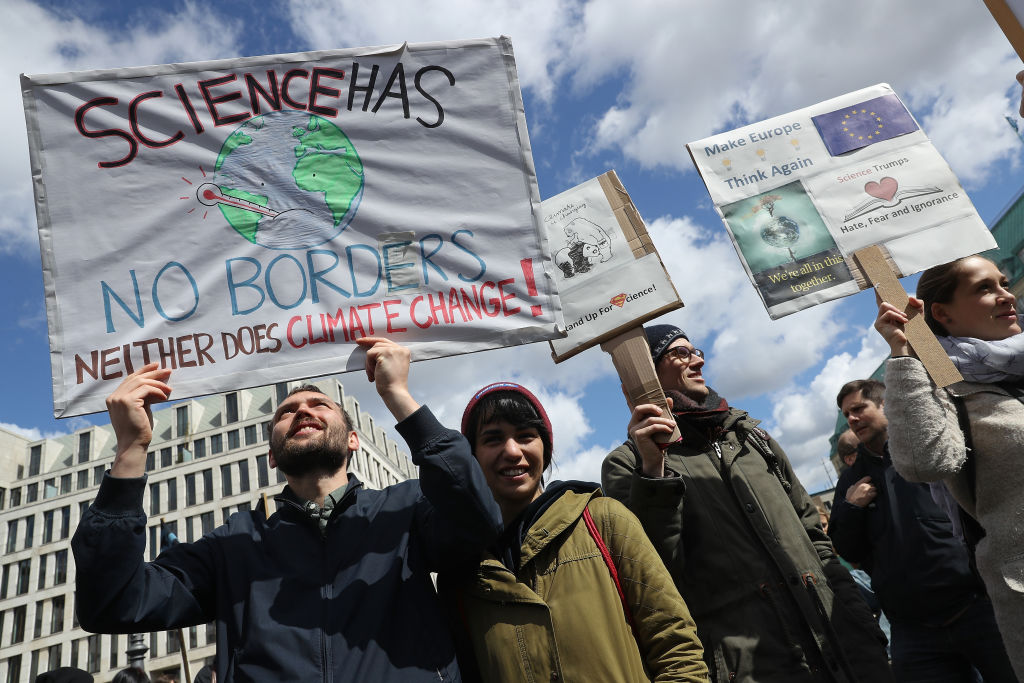
Scientists and science supporters around the world are gathering today (April 22) in Washington, D.C., and in more than 500 cities around the United States and the world, to stand up for the integrity of science and to voice concerns about science policies under the current White House administration.
The march, which coincides with Earth Day, will represent a range of scientific interests, with particular emphasis on the need to mitigate climate change and protect the environment. In Washington, a series of teach-ins will begin at 9 a.m. ET on the grounds around the Washington Monument. The march itself is scheduled to get underway at 2 p.m. ET, starting on Constitution Avenue NW at 15th Street and ending at Union Square. [In Photos: The Best Signs from the 2017 March for Science]
Live Science reporters will be covering the marches in Washington, D.C., New York City, Los Angeles, San Francisco and Honolulu. Follow along for live updates throughout the day.
Earth Day Network is also carrying a livestream of the March for Science, with live coverage set to begin at 10 a.m. ET. The day's program will include speeches, training sessions with scientists and civic organizers and musical performances.
1:45 a.m. ET -- About 700 people attended the Honolulu march. Heidi Shimada, a nuclear medicine technician at Castle Medical Center in nearby Kailua, said that she's marching to because she is concerned about people doubting scientific facts, and because she wants to overcome some current views of scientists. "I'm marching to to show the public that scientists get out there -- there's a stereotype that we just stay in our labs and don't get involved."

1:15 a.m. ET -- Pre-nursing student Michelle Holewa joined in the protest in Honolulu today, wearing a dinosaur costume, with a message.
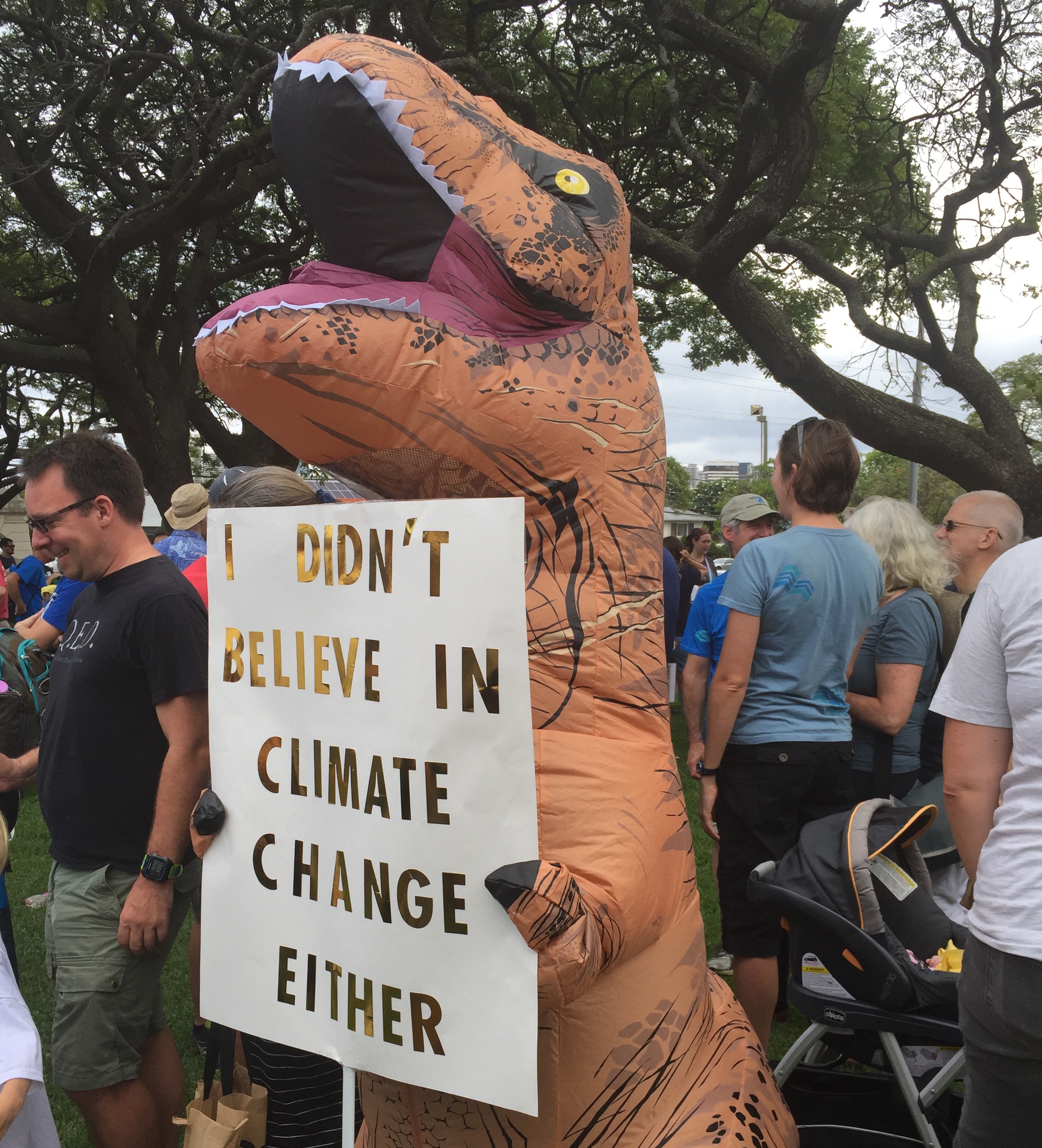
11:04 p.m. ET -- The crowd in the Honolulu march has erupted into a chant: "What does a scientist look like? This is what a scientist looks like." Patricia Fryer, a professor of geology at the University of Hawaii, and her daughter Katherine Fryer, who has conducted oceanic research, said they are marching because they are very concerned about the current public discussion about what is and isn't scientific research.
Sign up for the Live Science daily newsletter now
Get the world’s most fascinating discoveries delivered straight to your inbox.
10:34 p.m. ET -- LiveScience editor Karen Rowan is reporting from Honolulu, where the March for Science just began, at about 4:30 p.m. local time. "Hawaii is isolated, but we're really vulnerable to the effects of climate change," said Gerry Cobian, a graduate student in botany at the University of Hawaii at Manoa. "We're marching because scientists want people to recognize the importance of science in society."
Kanade Cobian is a chemist. "I'm marching because the people I talk to don't realize how much the budget cuts will impact science," she said.

7:45 p.m. ET - Not to be outdone, researchers in Antarctica took to Twitter to support the global March for Science. Renuka Badhe, Executive Secretary of the European Polar Board, shared a photo of scientists at Neumayer Station in Antarctica holding a sign with the following quote from Marie Curie: "Nothing in life is to be feared. It is only to be understood. Now is the time to understand more, so that we may fear less."
6:25 p.m. ET - Marches are still taking place, but here's our look back on the day's events: Tens of Thousands Protest 'Alternative Facts' at March for Science
3:08 p.m. ET - Our correspondent Mike Wall is reporting live from the March for Science in San Francisco. He snapped this photo of participants attending a pre-march talk near the Ferry Building.
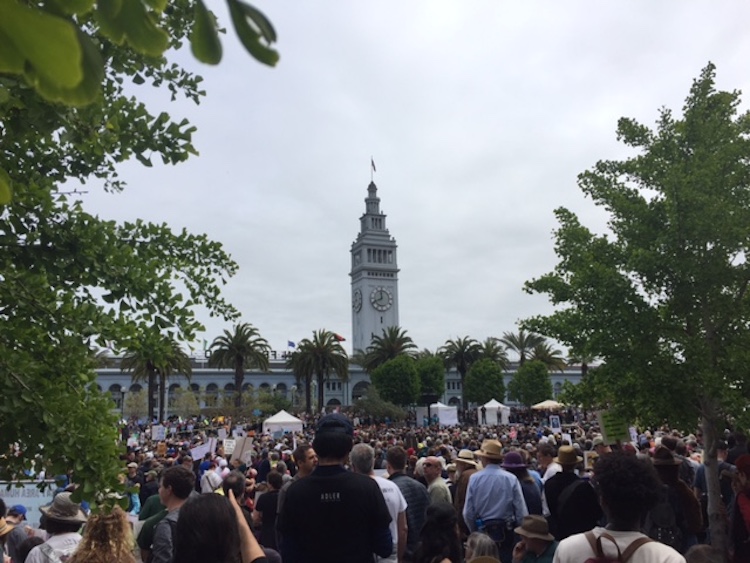
2:52 p.m. ET - Our correspondent Calla Cofield is on the ground in downtown Los Angeles, where 50,000 people signed up to participate in the march online, though she reports that event organizers are estimating that more are actually in attendance.
2:47 p.m. ET - In Washington, D.C., Space.com Managing Editor Tariq Malik caught up with Kat Fanning, a librarian student at the Pratt Institute and a research fellow at the American Museum of Natural History, both in New York City. Fanning said she's participating today "because it's important to show up to things. If you don't, you don't get your voice heard."
Tariq also reports that marchers are chanting: "Hey hey! Ho ho! Alternative facts have got to go!" Others are chanting: "Science! Not hate! Science makes America great!"
2:38 p.m. ET - Meanwhile, in New York City, the NYPD is estimating that 40,000 people took part in the March for Science. Our correspondent Hanneke Weitering was reporting live from the streets of Manhattan.
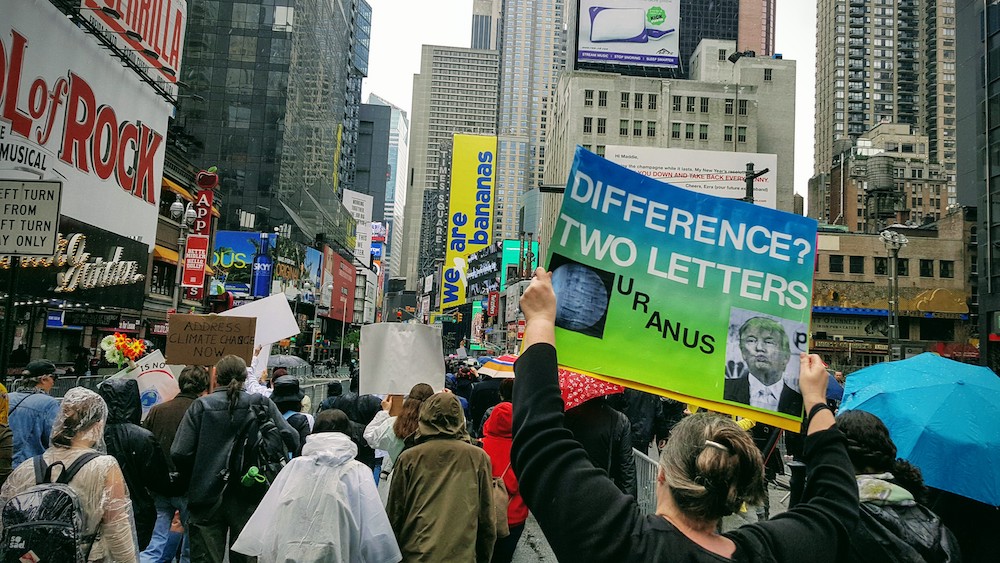
2:02 p.m. ET - The march is now underway in Washington, D.C. Participants will be making their way along Constitution Avenue NW toward Union Square.
1:46 p.m. ET - Pope Francis tweeted a message calling for people to protect the planet. The March for Science organizers projected the tweet on the main stage during the rally.
1:45 p.m. ET - Christiana Figueres, Mission2020 convener, closes out the speakers at the rally.
"We actually are at one of the most daunting crossroads in the evolution of human history. We're at the point where we must decide, are we going to ignore science or are we going to rise to the call of history and forge a new life on Earth paradigm? This life on Earth paradigm is where nature and humanity support each other. Can we do that? This is where energy is forever reneable and accessible to all. Can we do that? This is where transportation is clean and shared and smart. Can we do that? This is where the land is restored and is again producing the food that we need to provide the food security for those who don't have it today. Can we do that?" Figueres asked the crowd.
"For many years, I had a recurring dream. I had a dream of seven little pairs of eyes — black eyes always — that looked at me and asked me: What did you do? I want to tell you that that question I have understood is not a question to me. It's a question to all of us. All of us alive today. What did you do? And the answer, must be that we worked together to answer that question in one way— not that we did everything that we thought was possible, but that we did everything that we knew is necessary, because in that difference lies the future of mankind."
1:36 p.m. ET - Anousheh Ansari, an Iranian-American engineer and co-founder of Prodea Systems, recounts her personal journey with science.
"The language of science knows no race, no gender, no religion. It doesn't discriminate based on where you live or based on whether you're poor or wealthy. The apple falls from the tree under the same laws," and in the same way no matter where you are in the world," Ansari said.
1:13 p.m. ET - Michael Mann, Distinguished Professor of Atmospheric Science at Pennsylvania State University in State College, Pennsylvania, speaks at the rally about his role in pioneering scientific understanding of historic climate change.
"I was initially reluctant to be at the center of a fractious public debate on human-caused climate change, but I eventually came to embrace that role. Here we are at a crossroads," Mann said. "Never before have we needed science more to deal with the changing climate. All of us who care about science and our planet must now make our voices heard. And indeed, the entire world is listening."
1:03 p.m. ET - NASA astronaut Leland Melvin is speaking about his appreciation for science, particularly after gazing back at the planet from space during one of his space shuttle missions in February 2008.
"Let's work together as one team on this spaceship we call Earth," Melvin told the crowd on the National Mall.
12:41 p.m. ET - Mari Copeny, an 8-year-old from Flint, Michigan, who is nicknamed "Little Miss Flint, speaks to the crowd about the importance of science.
"Listen to me," Copeny said. "When we don't believe in science, and especially when our government doesn't believe in science, kids get hurt. That's what happened in Flint. For the sake of Flint kids and for all over this Earth, I march for science."
12:06 p.m. ET - Bill Nye takes the stage!
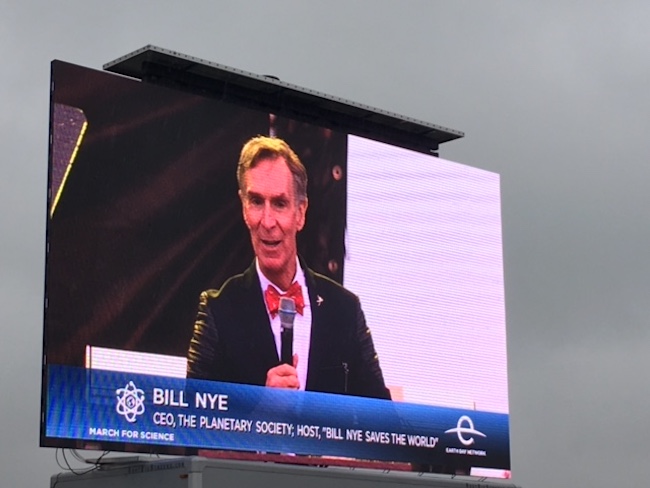
"We are marching today to remind people everywhere our lawmakers especially of the significance of science for our health and prosperity," Nye told the crowd in Washington, D.C.
"The framers of the Constitution of the United States, which has become a model for constitutional governments everywhere, include Article 1, Section 8, which refers to promoting the progress of science and useful arts. Its intent is to motivate innovators and drive the ecnomy by means of just laws. They knew that without the progress of useful arts and engineering, our economy would falter," Nye said.
"Yet today, we have a great many lawmakers, not just here but around the world, deliberately ignoring and actively suppressing science. Their inclination is misguided and in no one's best interest.
"Science must shape policy. Science is universal. Science brings out the best in us. With an informed, optimistic view of the future, we can — dare I say it — save the world."
11:59 a.m. ET - "We have so much to do over the coming years, so when you go back home, stay involved," said Sheril Kirshenbaum, executive director of ScienceDebate. "That means visiting your local schools, community centers, libraries, telling your story, sharing why science is so crucial to who we are, how we live. And please, take time to listen."
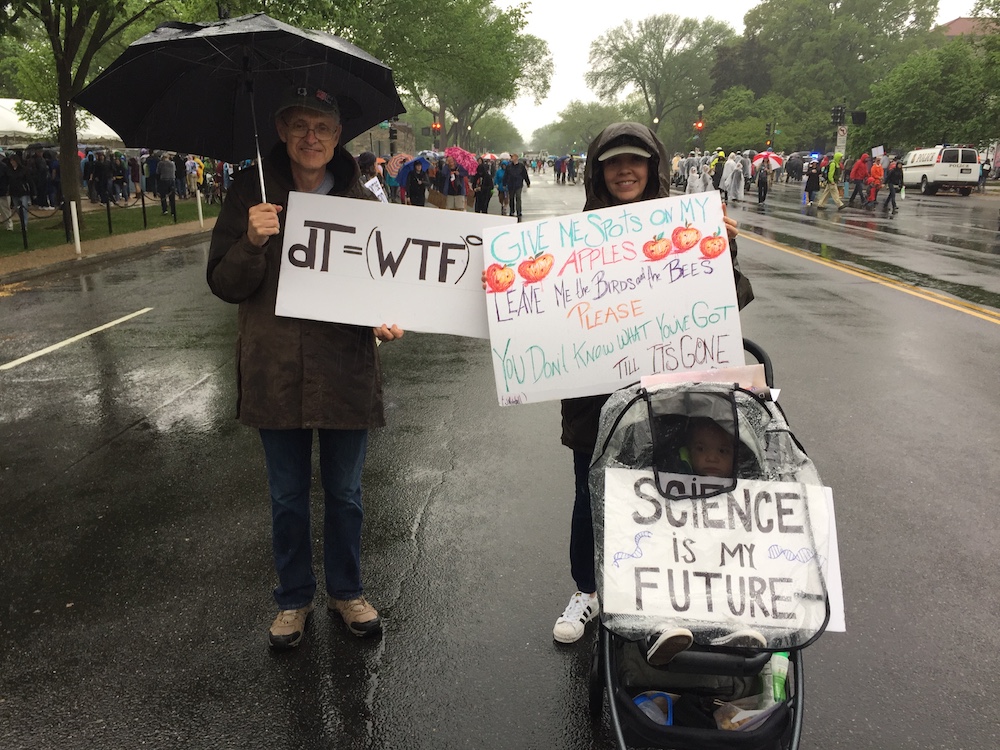
11:30 a.m. ET - Astronomer Nancy Roman, who was one of the first female executives at NASA, made an appearance at the D.C. event. Roman's role in planning the Hubble Space Telescope earned her the nickname "Mother Hubble."
11:04 a.m. ET - We're collecting photos from the various marches around the country (and around the world). Check out these snapshots from the 2017 March for Science.
11:00 a.m. ET - "I want us all to know, let's fight cynicism, let's lift each other up and let's go solve the hardest problems in the world together," Megan Smith, former Chief Technology Officer of the United States serving under President Barack Obama, said at the March for Science in Washington, D.C. "Let's make sure we get this government to lift up and support science and technology funding."
10:24 a.m. ET - Live Science Managing Editor Jeanna Bryner captured this photo of marchers filing onto the National Mall this morning in Washington, D.C.
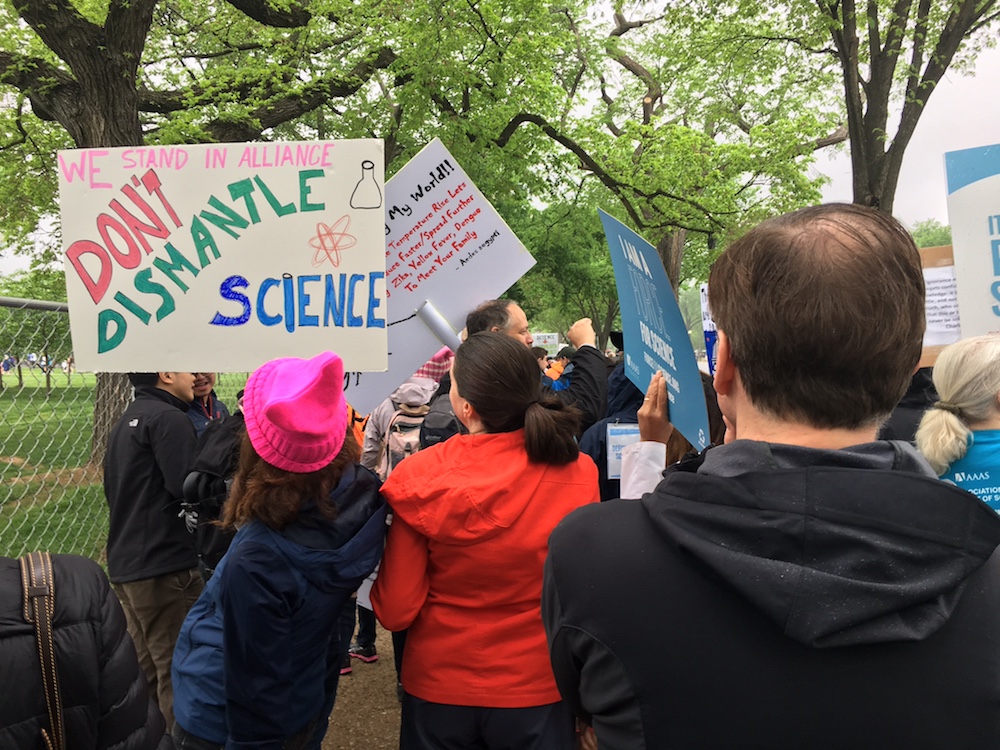
10:12 a.m. ET - Musician and March for Science co-host Questlove is now addressing the crowd. "I love science," Questlove said. "We need science to turn the present into the future."
10:10 a.m. ET - "We are gathered here today to fight for science. We are gathered to fight for education, to fight for knowledge, and to fight for planet Earth," Cara Santa Maria, host of "Talk Nerdy with Cara Santa Maria," said this morning at the March for Science in Washington, D.C.
10:07 a.m. ET - Derek Muller, creator of the YouTube channel "Veritasium" and co-host of the March for Science, kicks off the day's programs in Washington, D.C.
"We have to accept science in its entirety. I am here today because I embrace all of science, not just out of some blind belief, not just because it appeals to me, but because it's fundamentally based on rigorously, testable, verifiable evidence," Muller said. "I think we are all better off when we base our decisions on evidence, rather than hope, opinion and belief."
9:20 a.m. ET - "We at the Oceanographic Society have many stories to tell about the ocean, to celebrate the ocean and its creatures and to protect the ocean and its creatures," Julie Pullen, Councilor for Physical Oceanography at The Oceanographic Society and an associate professor of ocean engineering at the Stevens Institute of Technology in Hoboken, New Jersey, said at the AAAS pre-rally event.
9:05 a.m. ET - "Three things that I can try to extract from the cacophony around the march: The people are saying science is useful and relevant and exciting and just too important to people's lives to be downgraded and dismissed," Rush Holt, CEO of the American Association for the Advancement of Sciences (AAAS), said this morning during a pre-rally event at AAAS headquarters in Washington, D.C.
"They're also saying, if you want science to thrive and we all know everyone should want science to thrive then you have to defend the conditions under which science will thrive: free exchange of ideas, freedom to travel and collaboration, diversity of research perspectives, adequate support and I don’t mean just federal fiscal monetary support, yes that, but also societal support." He added that if conditions like these are maintained science pays society back in a great way.
"All over the world, people are saying public policy, public debate, public decisions should be based on evidence — evidence that has been vetted by science. That is the most reliable way to get good public policy."
"I haven’t seen anything like this in my long association with science going back a half a century. It is the first time i’ve seen this many scientists saying we should step out of the laboratory and into the public square. That in itself makes this march a success," Holt said.
8:30 a.m. ET - A pre-march rally is being held at the headquarters of the American Association for the Advancement of Science in D.C., from 8:30-9:30 a.m. ET. Speakers from the American Physical Society, the Oceanographic Society, the American Geophysical Union, the Association for Reserach in Vision and Ophthalmology and the Opical Society will describe why their organizations are supporting the March for Science. You can watch a livestream of the pre-march rally:
Original article on Live Science.

Denise Chow was the assistant managing editor at Live Science before moving to NBC News as a science reporter, where she focuses on general science and climate change. Before joining the Live Science team in 2013, she spent two years as a staff writer for Space.com, writing about rocket launches and covering NASA's final three space shuttle missions. A Canadian transplant, Denise has a bachelor's degree from the University of Toronto, and a master's degree in journalism from New York University.











